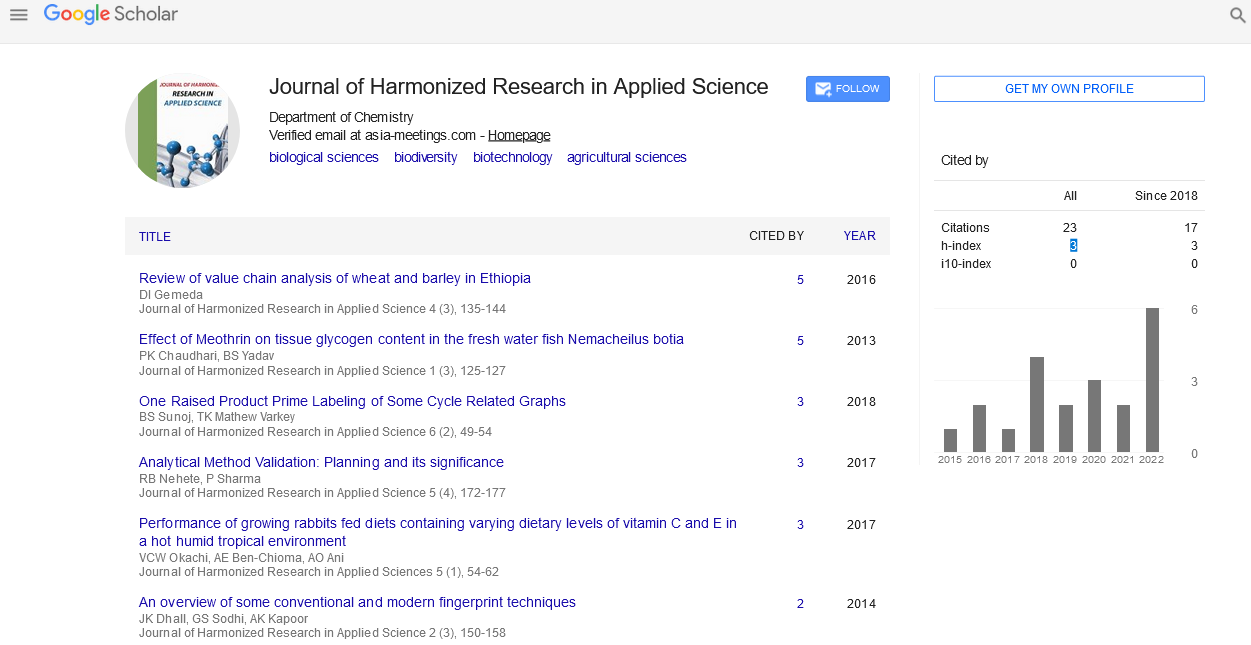Opinion Article - (2022) Volume 10, Issue 3
SOCIAL CONCERN AND PROSPECTS OF GENETICALLY MODIFIED CROPS
Houda Berrouk*Received: Aug 26, 2022, Manuscript No. JHRAS-22-78056; Editor assigned: Aug 30, 2022, Pre QC No. JHRAS-22-78056(PQ); Reviewed: Sep 14, 2022, QC No. JHRAS-22-78056; Revised: Sep 21, 2022, Manuscript No. JHRAS-22-78056(R); Published: Sep 28, 2022, DOI: 10.30876/2321-7456.22.10.005
Description
As the world population continues to grow, applying a holistic approach to pest management is critical for food security, agricultural sustainability and environmental protection. Genetically Modified (GM) crops that provide protection from insects and diseases, or herbicide resistance, are important tools that complement a variety of Integrated Pest Management (IPM) programs. However, despite the advantages of GM crops in simplifying approaches and improving the efficiency of pest and weed management, there are also challenges to successful introduction and sustainable use. In this article, we discuss how several GE traits, including those that confer protection from insects through expression of the Bacillus thuringiensis (Bt) protein, traits that confer resistance to herbicides, and RNA based traits that confer resistance to viral pathogens. It is examined to find out what gives the important elements of IPM plans for different cultures, both in developed and developing countries. It further emphasizes the importance of community engagement and expansion, strong partnerships between industry, regulators and farmers, and education and training programs to achieve long-term success. By understanding limitations of the technology, and considering the success and failures of GM traits in IPM plans for different crops and regions, which improves the sustainability and versatility of our plans. Genetically modified (GM) plants, also called transgenic plants, are characterized by insect resistance, herbicide tolerance, abiotic stress tolerance, disease resistance, high nutritional quality, and high yield potential, delayed maturity, enhanced ornamental value, male, sterile, and edible vaccine production. Another important goal of genetically modified plant breeding is their application as bioreactors to produce nutraceuticals, therapeutics, antigens, monoclonal antibody fragments, biopolymers, etc. Therefore, genetically modified crops have the potential to affect many aspects of modern society, such as agricultural production and medicine. Despite these potential uses, the use of GM crops for human benefit has been limited due to various social concerns and criticisms. These concerns fall into various categories, including health, nutrition, environmental, ecological, socioeconomic, and ethical concerns. These concerns include those arising from the properties of the GM plant itself, from transgene spread to other organisms, and from release into the environment. Such concerns have halted the commercialization of Bt cotton and Bt eggplant in India. Campaigns against GM crops have been fueled by cases of transgenic potatoes reported to be toxic to rats, unauthorized contamination of commercial corn products, and the killing of monarch butterflies by Bt corn pollen. In addition, Non- Governmental Organizations (NGOs) such as Gene Campaign, Centre for Sustainable Agriculture, Science, Technology and Ecological Research Foundation, Greenpeace, and Friends of the Earth have also expressed concerns about genetic engineering of plants. Regulators, activists, media personnel are indiscriminate and overly tolerant of misrepresentations and distortions by anti-GM activists. Some concerns don’t even have a scientific explanation, but today the amount of misinformation is so great that it’s difficult to separate the truth from the public perception of GM crops. However, the biotech scientist believes that GM crops should be publicly accepted because most of the concerns are not specific to GM crops and may also apply to non-GM crops. Genetic modification technology allows genes for specific traits to be transferred between species using experimental techniques.










